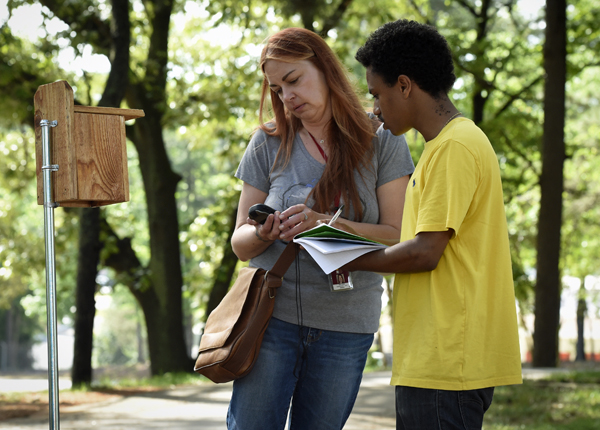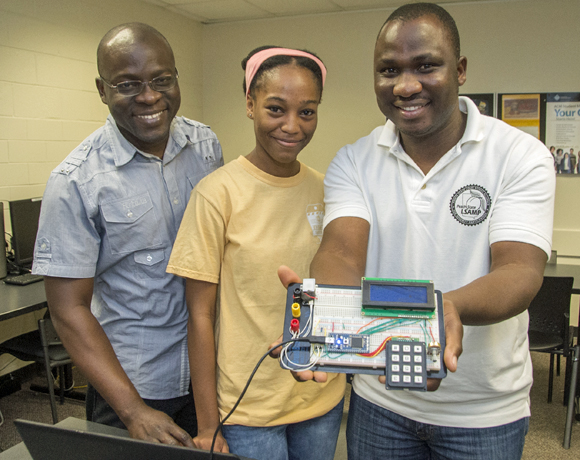
Student Euail Alemayehu, right, works with Professor Diane Lahaise to track nuthatch nesting habits on Georgia Perimeter’s Clarkston Campus. Alemayehu built a nuthatch birdhouse as part of his research project. (photo by Bill Roa)

Atsou Koudonou, Lovina Delph and Fo-Yao Alessou show biometric attendance system they built. (photo by Bill Roa)
Summer Bridge students tackle intense research
Georgia Perimeter students Lovina Delph, Atsou Koudonou, Fo-Yao Alessou and Yoseph Guta knew there was a problem with students trying to “scam” attendance machine at events.
Student I.D.’s were being swapped to gain access—and thus the credit—for attending events without adequate verification.
To tackle this issue, the engineering students are devising a biometric attendance system that stores digitized fingerprint data of students along with their student I.D. numbers.
“The fingerprints are converted to computer algorithms for security,” says Koudonou. “The future of our work will mean [we need to develop] hardware improvements and more network capacity.” The students hope to go beyond a single-digit I.D. to develop a 10-finger biometric system.
The group’s research and creation of a biometric attendance system was one of nine research projects presented recently by science, technology, engineering and mathematics students during Georgia Perimeter’s 2015 Summer Bridge Closing program.
The students’ research was as part an intensive three-week program run through LSAMP, the Peach State Louis Stokes Alliance for Minority Participation, along with STEP, the Science, Technology, Engineering and Mathematics Talent Expansion Program. Georgia Perimeter engineering and science faculty, as well as faculty and students from Georgia Tech, the University of Georgia and the University of Michigan, were research advisors for the students.
Begun in 2009, the Summer Bridge program is designed to give students concrete research experience they might not otherwise get while pursuing an associate degree, notes Margaret Major, the college’s LSAMP director and co-principal investigator for its STEP program.
The STEP program is funded through a National Science Foundation grant. STEP seeks to increase the number of students earning associate or baccalaureate degrees in established or emerging fields in the science, technology, engineering and mathematics area.
Students participating in the 2015 Summer Bridge program were Eresi Ojebe, Samuel Taiwo and Shantel Mitchell, “Chemical Analysis of a Water Sample”; Natilya Blades and Sarah Farhan, “Extraction of Natural Products and Analysis using GC and IR”; Hawa Daino, Sabine Mukesha and Samari Abdi, “Fecal Contamination in Food and Water”; Dawit Jekamo, O'Neilia Francis, Julian Barnes and Yetunde Maria Ogunlusi, “Installation and Management of Stream Measuring Instruments”; Brittany Lee, Katia DeCosta and Euail Alemayehu, “Making Room for Nesting Brown-headed Nuthatches in Georgia”; Nia Momon, Nur Hoodo and Dewaldo Klutse, “Using Microbiology and Molecular Biology to Track a Gastroenteritis Outbreak”; Lovina Delph, Atsou Koudonou, Fo-Yao Alessou and Yoseph Guta, “Portable Biometric Attendance System Integrated with a Web-based Attendance Portal”; Daniel Barnes and Vatis Fongang, “Development of a Characterization Set-up for Testing Thermoelectric Generators”; and Yitbarek Kazentet, “Thermomagnetic Nanofluidic Heat Transfer in Shell and Tube Heat Exchangers.”
